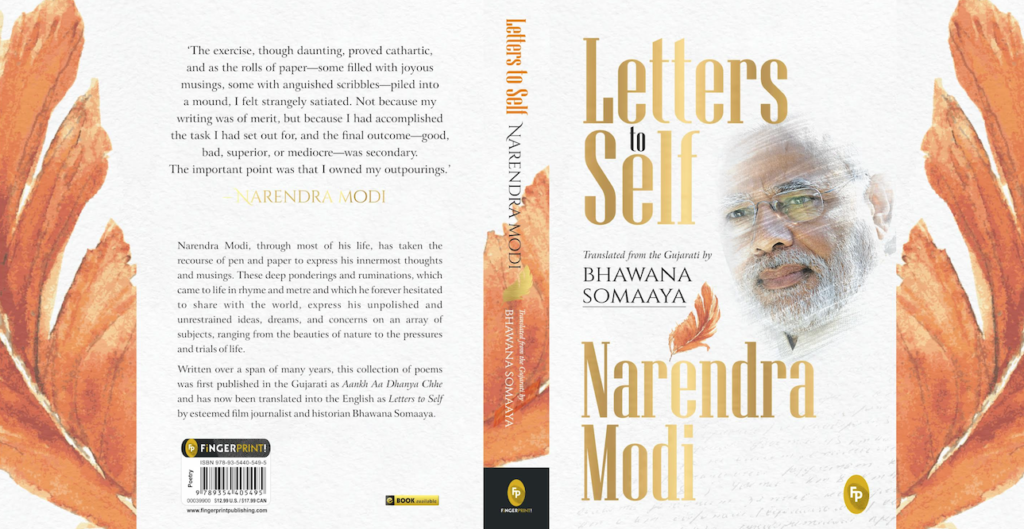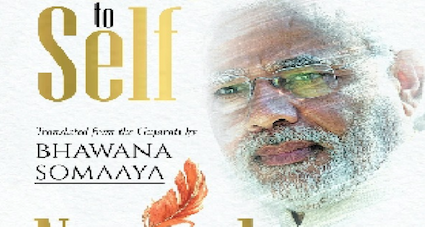New Delhi: Many say letter writing – for all practical reasons – is becoming a lost art, but India’s finest film writer has translated a host of poems written by Narendra Modi in Gujarati into English and proved us wrong.
We need to remember Modi was not the Prime Minister when he wrote these poems to himself. He wrote it over sometime, some years. His collection of poems, Aankh Aa Dhanya Che, was originally released in 2007, the year Pratibha Patil was elected as the first female President and India won the inaugural ICC T20 World Cup by defeating Pakistan in the finals.
A decade and a half have passed since then.
Letters to Self is a compilation of those poems by Bhawna Somaaya, the genial chronicler of Indian movies and an authority on the legendary Amitabh Bachchan.
Published by FingerPrint, the poems stretch through Modi’s imagination. It has India at its heart because for Modi there is no bigger emotion than his country. Sometimes, the poems – beautifully translated – look as if you were rummaging through your hallway closet. Sometimes, the poems look like a bunch of marigold flowers offered to the rising sun.
I picked up the first in the book, Gratitude, which felt like a tribute to the planet, Mother Earth, by a writer drawing his inspirations from the soul of the world.
Let’s read through the lines:
This planet is splendorous, And these eyes privileged
To feast on it
The sunlight drapes the lush, green grass
The sun rays intense and unbearable
The universe is awe-inspiring
This planet is splendorous
The rainbow rotates, makes circles in the sky
Sketches and fills colours in the air
Is this a blessing from previous births?
Gratitude, deep heartfelt gratitude
The waves bounce and touch the sky
Wonder what lies in the embryo of the clouds?
The completeness is the beginning
The planet is splendorous
In a large fair of faces, I meet so many
I feel ill at ease
In their company
Their disquietude
Is unsettling
And some of it, unimaginable
Gratitude, more gratitude
This planet is splendorous
Modi pays a fitting tribute to his nation, he wants it to be filled with hopes and dreams, he wants the earth to be both perfect and imperfect, but splendorous. He sees himself as one who has crossed over a million births to be born again in this nation, this very earth.
The letters are not all about the future but are snapshots inside the mind of the man who is the Prime Minister of a billion plus nation. The poems are emotionally evocative like a grandmother’s embroidered kantha quilt that is stored for generations. The poems – full of depth and optimism – deliver some unique personal insights of the Prime Minister than any work of fiction, or a movie could ever provide.
Writing poems to self is not easy, you repeatedly walk in and out of two characters, of a giver and a taker. You have the nation, its people and many things at the core of your heart. At times, the writer is being idealistic. I have a feeling he expects Indians to be nationalistic, he does not want Indians to stay home and watch terrible television and wait for that unexpected thing to happen to change the nation.
The letters show Modi wants Indians to be agents of change by looking forward and by looking back at where they had been.
I liked the one titled Trouble.
Once a beautiful, nubile river
Has scattered, turned ferocious
Like a tigress on the prowl
Lashed by heavy rains
She has overstepped
Shed all inhibitions
Lost control,
Like a woman
Who has lost her mind
She flows insanely
Probably unaware
How hard and cruel
Her water has transformed
In the drowned villages
Disrupted structures
Swept away corpses
So many lives lost
So many shrieks
So many cries for help
All dissolve into water
And flown away
The fury of nature
Expose the cruelty
Of life-threatening sea
I have a feeling the writer is explaining the vagaries of nature, tensions that often grip the nation and create both pain and anguish, tensions and sorrow. Modi is open about the pains one suffers; he has not sealed his thoughts in a notebook and shoved it in a desk drawer. The poems are a uniquely visceral experience, a style of communication that takes time, dedication and patience of the writer and his recipients. In many ways, it is antithetical to the modern ideas of communication.

Letters to Self, appeared to me like a cardboard box filled with words, images and sketches, written in ink with care and purpose. In the first lines of the book that says Dedicated to My Mother Tongue, the writer makes it clear that he is neither a litterateur nor a poet. “At the best you may call me an admirer or words.”
“For a long time, I have been in the process of accumulating my half-baked, part-delayed, part-scattered outpourings published at different times on different platforms. Finally, they have been strung together and compiled in this book,” writes Modi.
And then he writes: “I plead you to not equate my expression with my post or position, rather celebrate it for the merit of the thought and the emotion. The prose poetry in this book reflects my feelings, experienced from my little window of life.”
He wants you to feel the excitement of physically holding a letter that is written in ink with care and purpose. It is a practice in both intimacy and formality. His letters give space to open up with unparalleled casualty and familiarity.
Like the last one in the book, Eleventh Direction, the one that is rarely ventured into by mankind. It is the place where the Self resides, a point where it becomes only a witness to the periphery of the wheel of life.
Fearless mind
A tuneful song
Everlasting
Love in the heart
A smile like a dream
A cheerful wind
A scented sky
It’s the seeker who makes
Every moment precious
The earth
Is forever
Affectionate
Fragrant
The Lord, my beloved
I stare at unblinking
There is no past
Nothing unknown
Just immortal
Moments
No rituals
No ceremonies
Just quietude
Reflected
On my face
Far away
From ten directions
A song plays quietly
In the eleventh direction
A wonderful read.
How come I do not see it on the stands of bookstores?
(Shantanu Guha Ray is a Wharton-trained journalist and award-winning author. He lives in Delhi with his wife and two pets. He won the 2018 Crossword award for his book, Target, which probed the NSEL payment crisis.)


